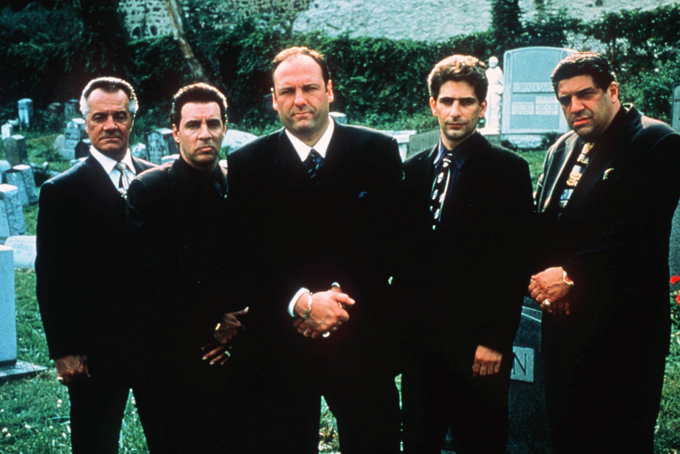
by John Avlon
(CNN) — Why do we love gangsters — at least the ones on TV and in the movies?
The sudden death of actor James Gandolfini at age 51 has brought a round of instant nostalgia for the HBO show he led at the turn of the millennium, “The Sopranos.” It helped define the time for people living it, stretching between the excesses of the Clinton years and the grim patriotic grit of the post-9/11 period.
There was very little admirable about the character of Tony Soprano — most of us don’t murder on our lunch break — and yet he became a kind of elevated everyman.
From the commute home to New Jersey shown in the opening credits — over the techno-blues of Alabama 3’s “Woke Up This Morning (And Got Myself a Gun)” — to Tony’s constant struggles to keep in control at work, this was a violent fantasy for middle-aged managers who want respect.
A half-century ago, cowboys and Indians were the quintessential American set piece for TV and film. The pioneer life was still within living memory. But since at least the 1970s, with Francis Ford Coppola’s “Godfather” films, the Mafia has become our central media metaphor. We are a nation of people who live in and around cities, more the descendants of immigrants than Western pioneers. The struggle is less for settling land and taming wilderness than it is for money and respect and defense of our family. The goal is getting ahead and living the good life.
Gangster fantasies also undercut the old adage that there is no honor among thieves. While the Sopranos crew was often a rolling disaster of violent incompetence, Tony was the flawed moral anchor of the Mafia family, trying to instill some values even while acknowledging (reluctantly, in private) his own hypocrisy and contradictions.
What made “The Sopranos” different from the boatload of Mafia shows that came before it was that Tony was in therapy. The sight of a mobster having an anxiety attack and suffering through psychotherapy was the central conceit of the show, the selling point of the pilot episode that led to the six-season series. But if “talking about your feelings” seemed like the least masculine thing you could do, here too Tony represented the plight of the modern American male, reconciling his animal instincts with polite society. Therapy is where strong silent types get sent to be civilized.
Good luck. Part of the appeal of the show was the fantasy of being able to vent frustrations violently. “The Sorpanos” was the anti-“Seinfeld.” While Jerry and crew fixated on the small annoyances of daily life from the perspective of Manhattan’s Upper West Side, Tony and his crew reacted to the small frustrations of daily life with violence over in New Jersey, punishing the pretentious, dishonest and arrogant with vicious beat-downs and more than a few bullets to the chest. They weren’t going to be anyone’s nominee for civic leader, and yet the guilty pleasure came from watching oversensitive thugs refuse to take any crap from anybody.
For middle-aged men, I always suspected that part of the appeal of Tony Soprano was the archetype he provided that fat men, who eat and drink and smoke too much, can be recognized as central figures rather than side characters. Overburdened with work and the weight that comes with too many good times under his belt, Tony was the patriarch who demanded respect and ultimately received it. He was oversexed and had what might be described as Old World notions of fidelity, despite his appearance, because “power is the ultimate aphrodisiac” — and yes, I just quoted Henry Kissinger in a column about Tony Soprano.
All of which is to say that Tony Sorpano was not admirable, but was an eminently relatable figure for men who wrestle with the competing pressures of raising a family, running a business and being a man. He provided validation for their own mistakes and made them look good by comparison. When they struggled with their children, the disrespect Tony endured from his two kids made the domestic seem dramatic. When the average guys’ own dim-witted bosses, for whom they do all the day-to-day work, tried to undercut them, Tony’s struggles with Uncle Junior (who tries to have him killed) made their own frustrations seem manageable.
In the end, having a Mafia show be a metaphor for daily life doesn’t exactly reflect a country living up to its best traditions. But then the gap between fiction and reality is always stark, especially in the rearview mirror. Tony Soprano mattered to so many people because his struggles were their own, writ large, and he could take decisive actions to demand respect for himself and his family that they could only fantasize about, trying to maintain control and impose something like sanity on all the constantly moving craziness that surrounds us.
Editor’s note: John Avlon, a CNN contributor and senior political columnist for Newsweek and The Daily Beast, is the author of “Independent Nation” and “Wingnuts.” He won the National Society of Newspaper Columnists’ award for best online column in 2012.